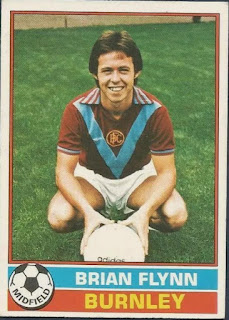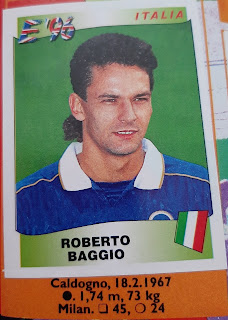78: Brian Flynn, Burnley, Topps English Footballer Picture Cards 1977/78
Emlyn Jones brings us the story of an oft-overlooked footballing mastermind today who is undoubtedly partly responsible for the fact that Wales are heading to their first World Cup since 1958 this winter. If there is any justice the Manic Street Preachers will be on hand to pay tribute ahead of the spectacle in Qatar. Over to Emlyn.
Today's article was inspired by the fantastic Left-Sided Problem's excellent article on Mark Hughes' time as manager of the Welsh national team – a time I remember fondly as the first time I could personally feel some pride in Wales' football exploits after years of complete bilge. Reading about that period of the nation's history brought to mind another man that deserves a huge amount of credit for the improvement in fortunes since the dark days of the 1990s: oft-unsung hero Brian Flynn.
In his youth, Flynn was regularly told he was too small to make it as a professional. Standing a diminutive 5’ 4” when he received his first boot sponsorship the firm were initially unable to supply boots small enough. Nonetheless, the combative midfielder was able to force his way into the Burnley team, and in only his third season was selected for the Welsh national side – and on debut, scored his first goal as a professional. He moved to Leeds United between 1977 and 1982, starting over 150 games, before returning to Burnley for a further spell. It was during this second spell he scored his most famous international goal somehow rising above the Brazilian defence to score a great header.
There followed a nomadic period, with single seasons at Cardiff City, Doncaster Rovers, Bury, Limerick and Doncaster again, before joining Wrexham. While still playing, Flynn was appointed manager in 1989, and became synonymous with the North Wales side over a twelve-year management stint at the end of which only Sir Alex Ferguson and Dario Gradi had been with league clubs for longer. Flynn took the club into Europe qualifying for the Cup Winners’ Cup. With Wrexham playing in the English system, he also took the club into the second tier and managed FA Cup victories over West Ham United and then league champions, Arsenal. In 2002, he moved to Swansea City, then languishing in bottom spot in the entire Football League. He rebuilt the side, with 21 players debuting that season, and a 4-2 win over Hull City on the final day saw the Swans retain their league status. Flynn took the club to the FA Cup fifth round the following season, but lost his job after a loss in form. Wales were quick to identify the potential value Flynn could add and in 2004 appointed him as Wales Intermediate Team Manager – broadly, coach of the under-17, under-19 and under-21 sides.
Wales had missed out on Euro 2004, victims of Russian doping scandals and a lack of squad depth resulting in jaded performances, having led the group at the midway stage. Flynn set about building the player pool, attending an average of twelve games a week, and identifying young players who could qualify for Wales by ancestry. This saw not only higher quality players available, but also meant the players in the squad were able to train at an improved level. Wales very nearly qualified for the UEFA 2009 Under-21 Championships, however, despite winning their group they still faced a playoff against the vastly better funded English side, losing 5-4 on aggregate. The following campaign also saw Wales miss out, this time on the bizarre 'head-to-head away goals' rule to Italy (despite having a better goal difference). Far from disappointed, Flynn saw the experience as seeds sown for the senior side.
Following a short period as caretaker coach between John Toshack's departure and Gary Speed's appointment, Flynn left his role with Wales in 2012, having overseen the transition from a squad often a headache to populate to a production line that continues to develop and expose players to the international scene. Before he took over, the under-21 side had failed to win a game between 1997 and 2002, managing 26 matches without notching a victory. Looking back, you can see how many of his players became stars; eight of the starting eleven in 2007's 4-3 win over Sweden were in Wales' Euro 2016 squad.
Following his Wales role, Flynn worked as a scout for Doncaster, taking over as manager following the departure of fellow Welshman Dean Saunders. In his first season, he won the League One title in a remarkable finish to a game which saw the title decided with a last minute penalty kick. Brentford missed the kick at 0-0 with seconds remaining, only for Doncaster to counter attack and score the winner. Rather than continue managing the side in the Championship, Flynn preferred to focus on developing players, taking a role as Director of Football with oversight of the development squad.
Former Flynn signing Roberto Martinez brought him to Everton as a scout in 2014, however, following Martinez's sacking in 2016, Flynn took on scouting duties with Premier League Swansea City. During his time at the club there were debuts for future Wales stars Dan James and Connor Roberts but following relegation the scouting team were dismissed. Flynn returned to Wrexham the following year where he remains to this day as assistant manager.
Flynn was instrumental in guiding the development of a clutch of young Welsh players who would go on to full international honours, and ultimately form the squad that finally reached qualification for a major tournament in 2016. Some of these players have gone through the entire Welsh system together; names such as Chris Gunter, Wayne Hennessey, Joe Allen, Aaron Ramsey and Gareth Bale, and the small matter of the combined 466 senior caps received by those players alone (to date).
The biggest success is inarguably in the depth of knowledge the setup now has. To illustrate this, the scorers for Wales against Belgium in the Euro 2016 quarter-final were all born in England, and only brought into the setup having qualified via having Welsh grandparents. It was Flynn who had identified all three, Ashley Williams, Hal Robson-Kanu and Sam Vokes, through his diligence and knowledge building. It was Flynn who moved the young Gareth Bale into a more attacking role, while his club manager Harry Redknapp was playing him as a left back (and a left back who didn't win a game for 24 matches at that). One can't forget Gary Speed, Mark Hughes, Chris Coleman, and others for the journey Welsh football has been on over the past couple of decades, but one name that deserves to be heralded much more loudly is the 5’ 4” man who looked past physical characteristics, instead preaching "Ability, Attitude, Intelligence" – Brian Flynn, the mastermind of the Welsh rise.





Comments
Post a Comment